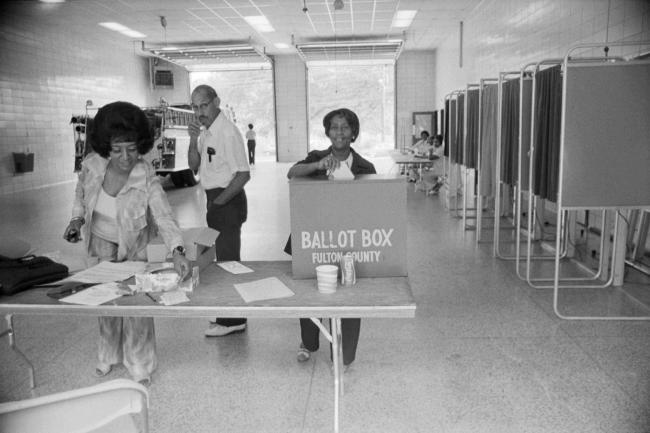
View of unidentified individuals voting at a fire station in Atlanta, Georgia, ca. 1978. | Boyd Lewis Photograph Collection, VIS 101.559.006
We’re in it! For the first time since our founding nearly a century ago, Atlanta History Center served as an early voting location and a polling place on November 3. We’re proud to be a community resource on Election Day and beyond, providing Atlantans with the tools to make history.
It seems especially pertinent in 2020 that Atlanta History Center would serve as a polling place. This year marks the centennial of the 19th amendment, which granted women suffrage, and the 55th anniversary of the Voting Rights Act, which toppled barriers put in place to silence historically marginalized groups across the country.
This year, we have used the lens of citizenship to explore different aspects of our city’s past. From Black women’s struggle for suffrage to Atlanta’s winning of the bid to host the 1996 Olympic Games, there’s much to learn about what it means to be an active and engaged member of the community.
In that spirit, we’ve created a toolkit to help Georgians prepare to exercise their right to vote, select the method by which they vote, and to identify and report instances of voter intimidation—on November 3 and beyond. If you’d like to learn more about registering to vote, Georgia’s Voter ID Laws, how to volunteer as a paid poll worker, check out our National Voter Registration Day resource guide.
Don’t forget your mask!
A Brief History
As John Lewis reminded us, “the vote is sacred.” Over the years activists like Lewis advocated for an end to voter discrimination—and often faced violent opposition. Since the first Civil Rights Act of 1870, our nation has evolved towards protecting Americans’ right to vote and lower the barrier of entry to exercise that right. Here’s an overview of each federal voting rights legislation and its implications on the electorate.
- The Civil Rights Acts created some of the earliest federal protections against discrimination in voting. These protections were first outlined by the Civil Rights Act of 1870 and were later amended by the Civil Rights Acts of 1957, 1960, and 1964. The original Civil Rights Act provided criminal penalties for those attempting to prevent African Americans from voting by using or threatening to use violence or engaging in other tactics, such as making threats to terminate a person’s employment or evict them from their home. As a result of the act, the criminal jurisdiction of the federal courts was expanded.
- The Voting Rights Act of 1965 prohibited voter discrimination based on race, color, or membership in a language minority group. It also required certain places to provide election materials in languages besides English.
- The Voting Accessibility for the Elderly and Handicapped Act of 1984 required polling places to be accessible to people with disabilities.
- The Uniformed and Overseas Citizens Absentee Voting Act (UOCAVA) of 1986 allowed members of the U.S. armed forces and overseas U.S. voters to register and vote by mail.
- The Military and Overseas Voting Empowerment (MOVE) Act of 2009 improved access to voting by military and overseas voters.
(via USA.gov)
Know Your Rights Before Voting
- If the polls close while you’re still in line, stay in line—you have the right to vote.
- If you make a mistake on your ballot, you have the right to ask for a new one.
- If the machines are down at your polling place, you have the right to ask for a paper ballot.
- If you experience any issues or have questions on Election Day, call the Election Protection Hotline.
- English: 1-866-OUR-VOTE / 1-866-687-8683
- Spanish: 1-888-VE-Y-VOTA / 1-888-839-8682
- Arabic: 1-844-YALLA-US / 1-844-925-5287
- For Bengali, Cantonese, Hindi, Urdu, Korean, Mandarin, Tagalog, or Vietnamese: 1-888-274-8683
(via vote.org)
What do I need to bring with me to the polls?
Georgia law requires individuals to show photo identification when voting in-person. (Learn how to apply for a Georgia-issued identification card.) You are not required to provide identification when you vote absentee by mail.
If an acceptable ID is not presented, the voter votes on a provisional ballot and must return to show ID within three days. (Learn more about provisional ballots in the Georgia Voter Information Guide.)
(via Georgia Secretary of State)
Voter Intimidation
Voter intimidation can take many forms.
Federal law says that "no person … shall intimidate, threaten, coerce … any other person for the purpose of interfering with the right of [that] person to vote or to vote as he may choose." Many states have their own laws prohibiting voter intimidation.
Examples of intimidation at a polling place may include, but are not limited to::
- Intimidation | This may include physically blocking entrance to voting, verbally harassing people waiting to vote, looking over people’s shoulders while they vote, questioning voters about their choices or citizenship status, asking for multiple forms of identification
- Coercion | This may include offering money to vote for a certain person, spreading false rumors about candidates or voting, displaying signs with false or misleading information, impersonating poll workers or election officials
- Threats | These may include comments such as “your family will be deported if you vote,” “you will be fired from your job if you vote,” “your child won’t make the football team if you vote.”
- False information | Spreading false information about voting requirements, including literacy tests
(via Vote.org)
18 U.S.C. Chapter 29: Elections and Political Activities outlines in detail what is and is not considered voter fraud or other illegal election activities.
How to report instances of voter fraud or voter suppression:
- Fill out the Stop Voter Fraud form. Your statement will be forwarded directly to the Georgia Secretary of State’s Elections Division.
- Call Georgia’s Voter Fraud Hotline at 877-725-9797.
- Report intimidation to the Election Protection Hotline at 1-866-OUR-VOTE or 1-888-VE-Y-VOTA (en Español).
- Report intimidation to your local election officials. Their offices will be open on Election Day.
- Contact the Voting Section of the Civil Rights Division of the Department of Justice
(via Georgia Secretary of State, House.gov, and Vote.org)
Your Story Matters
Like all other aspects of life in 2020, voting looks different this year. We invite you to share your stories with us through the Atlanta Corona Collective, an initiative created with the aim of documenting Atlantans’ experiences during the COVID-19 pandemic.
- Did the pandemic change the way by which you voted? How did you cast your ballot this year?
- Did you participate in mail in or early voting for the first time during the 2020 election?
- What was your experience like waiting in line to vote? Did you experience a long, socially distant wait?
- Did you volunteer as a poll worker or poll watcher?
- Did you help register people to vote ahead of the election?
We're asking for any items (e.g. objects, video, audio, photography, papers, typed stories or personal reflections, etc.) that you feel capture your pandemic experience. For more specific examples of the types of materials we are looking for, please read our blog post.
The stories and materials of the Atlanta Corona Collective will be important research and teaching tools and allow all of us to share these experiences in the future.
Additional Resources:
- Georgia.gov
- Rock the Vote | Georgia
- My Voter Page | Georgia Secretary of State
- Information on polling places
- Change/update voter registration online
- Vote.org
- A quick, user-friendly hub that allows you to check your registration, become a poll worker, and set helpful election reminders
- Election Protection
- Vote411 | League of Women Voters Education Project
- Register to vote + check your registration status
- Find out who’s on your ballot



